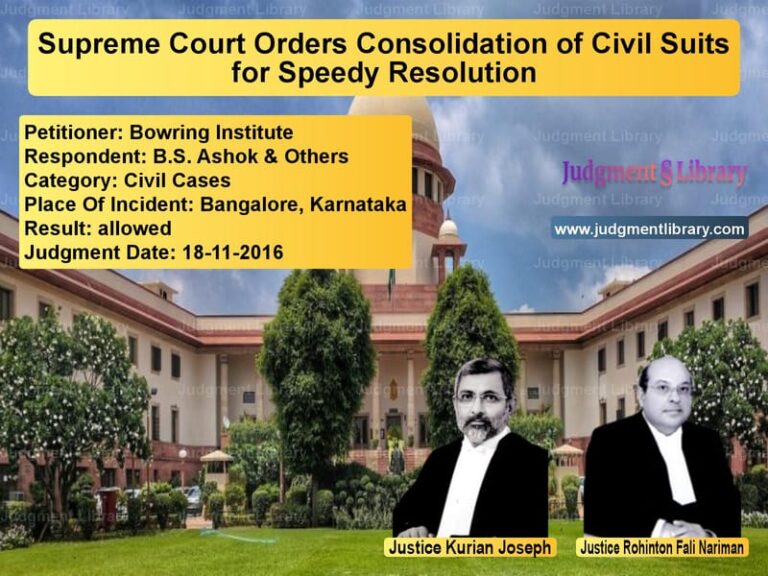Landlord-Tenant Dispute Under Kerala Rent Control Act: Supreme Court’s Final Verdict
The dispute between Addissery Raghavan and Cheruvalath Krishnadasan arose from an eviction petition filed by the landlord under the Kerala Building (Lease and Rent Control) Act, 1965. The case revolves around the landlord’s claim that he required the tenant’s premises for additional business accommodation, while the tenant contended that alternative spaces were available and that eviction would cause undue hardship. The case progressed through multiple judicial forums before reaching the Supreme Court.
Background of the Case
The tenant, Addissery Raghavan, occupied two small shop rooms – one on the ground floor and the other on the first floor – for his textile business. The rooms were leased to him by the respondent-landlord, Cheruvalath Krishnadasan, at nominal rents, which were later increased. The landlord filed eviction petitions (RCP No. 175/2013 and RCP No. 176/2013) on three grounds:
- Arrears of rent: The landlord claimed that the tenant had defaulted in paying rent.
- Bona fide requirement: The landlord stated that he needed the premises for expanding his business under Section 11(8) of the Kerala Rent Control Act.
- Material damage: The landlord argued that the tenant had caused damage to the rented premises.
The trial court dismissed the claims of arrears of rent and material damage but ruled in favor of the landlord on the ground of bona fide requirement, granting him possession of the premises.
Tenant’s Appeal Before the Appellate Authority
The tenant challenged the trial court’s decision before the Rent Control Appellate Authority, which overturned the trial court’s ruling. The appellate court found that the landlord owned multiple properties with vacant spaces, making eviction unnecessary. The judgment highlighted key findings:
“The evidence presented, including the Commissioner’s Report, indicates that the landlord has several vacant rooms available in the same building as well as in other buildings owned by him. The necessity to evict the tenant is not convincingly established.”
The appellate court also emphasized comparative hardship, ruling that the tenant, a small textile shop owner, would suffer greater hardship if evicted, while the landlord had sufficient alternative spaces.
High Court’s Reversal
The landlord then filed a revision petition before the High Court of Kerala. The High Court set aside the Appellate Authority’s ruling and reinstated the trial court’s decision, stating:
“Under Section 11(8), only vacant space in the same building should be considered, and vacant space in other buildings owned by the landlord is irrelevant to determining the bona fide requirement.”
The High Court further held that the tenant had access to another shop room in a nearby building, reducing his claim of hardship.
Supreme Court’s Review and Judgment
The tenant approached the Supreme Court, challenging the High Court’s decision on multiple grounds, including the improper exercise of revisional jurisdiction. The Supreme Court observed that the High Court, in its revisional role, had exceeded its jurisdiction by reappreciating evidence. The Court ruled:
“The High Court, in revisional jurisdiction, cannot interfere with findings of fact unless they are perverse, based on no evidence, or result in a miscarriage of justice.”
The Supreme Court noted that the Appellate Authority’s findings were based on substantial evidence, including the availability of vacant spaces owned by the landlord. The Court reiterated the principles governing landlord-tenant disputes under the Kerala Rent Control Act, emphasizing that eviction should be granted only when genuine necessity is established.
Key Findings of the Supreme Court
- The High Court erred by substituting its findings over those of the Appellate Authority without proving any perversity in the lower court’s ruling.
- The availability of vacant spaces in the landlord’s possession was a valid consideration in determining the necessity of eviction.
- Comparative hardship favored the tenant, who would suffer a significant impact if evicted, whereas the landlord had sufficient alternative accommodations.
The Supreme Court, therefore, set aside the High Court’s judgment and reinstated the Appellate Authority’s ruling in favor of the tenant.
Conclusion
This ruling strengthens the principle that landlord-tenant disputes under rent control laws must be decided based on necessity and hardship analysis. The Supreme Court’s decision ensures that tenants are not unfairly evicted when landlords have reasonable alternatives available, reinforcing legal protections under the Kerala Rent Control Act.
Petitioner Name: Addissery Raghavan.Respondent Name: Cheruvalath Krishnadasan.Judgment By: Justice R.F. Nariman, Justice Navin Sinha, Justice B.R. Gavai.Place Of Incident: Kerala.Judgment Date: 08-06-2020.
Don’t miss out on the full details! Download the complete judgment in PDF format below and gain valuable insights instantly!
Download Judgment: Addissery Raghavan vs Cheruvalath Krishnad Supreme Court of India Judgment Dated 08-06-2020.pdf
Direct Downlaod Judgment: Direct downlaod this Judgment
See all petitions in Property Disputes
See all petitions in Landlord-Tenant Disputes
See all petitions in Specific Performance
See all petitions in Damages and Compensation
See all petitions in Judgment by Rohinton Fali Nariman
See all petitions in Judgment by Navin Sinha
See all petitions in Judgment by B R Gavai
See all petitions in allowed
See all petitions in supreme court of India judgments June 2020
See all petitions in 2020 judgments
See all posts in Civil Cases Category
See all allowed petitions in Civil Cases Category
See all Dismissed petitions in Civil Cases Category
See all partially allowed petitions in Civil Cases Category







